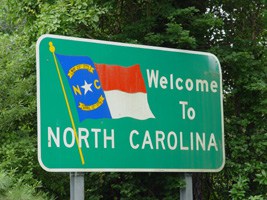 Back on April 28th, I e-mailed the Mayor of Greensboro, Yvonne Johnson, requesting that the City of Greensboro look at the resolution that Raleigh passed opposing HB1252/S1004 and pass a similar resolution. I am quite aware of what goes on in my city, but this slipped past me. At the May 5th City Council meeting the following transpired:
Back on April 28th, I e-mailed the Mayor of Greensboro, Yvonne Johnson, requesting that the City of Greensboro look at the resolution that Raleigh passed opposing HB1252/S1004 and pass a similar resolution. I am quite aware of what goes on in my city, but this slipped past me. At the May 5th City Council meeting the following transpired:
Assistant City Manager Denise Turner reviewed the resolution of the City of Greensboro opposing SB1004/HB 1252, inaccurately captioned “The Level Playing Field Act” with Council. Councilmember Perkins moved adoption of the resolution. The motion was seconded by Councilmember Bellamy-Small.
Assistant Manager Turner provided an explanation for the basis of the bill, the incentives of the bill, affects on the City on offering broadband usage throughout the City, the funding utilized, restrictions of the bill and stated that the bill would prevent municipalities from offering and providing broadband services as an incentive to incoming businesses. Assistant Manager Turner provided information as to Economic Stimulus funding for broadband usage and access for a municipality to provide.
The resolution was adopted on the following roll call vote: Ayes: Barber, Bellamy-Small, Groat, Johnson, Matheny, Perkins, Rakestraw, Wade and Wells. Noes: None.
133-09 RESOLUTION OF THE CITY OF GREENSBORO OPPOSING SB 1004/HB 1252, INACCURATELY CAPTIONED “THE LEVEL PLAYING FIELD ACT”
WHEREAS, Senate Bill 1004 and House Bill 1252, both captioned The Level Playing Field Act, have been introduced in the 2009 Session of the General Assembly of North Carolina, and referred to the Senate Commerce Committee and House Committee on Science and Technology, respectively; and
WHEREAS, broadband is communications infrastructure that is as important to the City of Greensboro’s economy as are the interstate and state road systems; and
WHEREAS, high-speed broadband is an indispensable part of competition both between businesses and between global, state and local jurisdictions to attract businesses; and
WHEREAS, high-speed broadband is vital to the future economic development, educational outreach, and community growth necessary to replace lost textile, tobacco, furniture and manufacturing jobs in Greensboro and in North Carolina; and
WHEREAS, cities are organized to provide public services in the local community and their governing boards generally decide what and what level of services the city will provide; and
WHEREAS, the courts in North Carolina have already determined that local governments are authorized by the General Assembly to provide the communications services addressed in the playing field bills; and
WHEREAS, if the City of Greensboro should at any time in the future decide that it needs to provide or encourage the development of broadband communications systems to meet unmet needs, these proposed bills would greatly hinder the City’s ability to provide such needed services, especially advanced high-speed broadband services; and
WHEREAS, the bills do not in actuality require a “level playing field” with regard to provision of broadband and information services but instead seek to saddle cities and towns with several onerous duties, proscriptions and mandates that do not apply to private providers and that cities have never had to meet with respect to other enterprise businesses; and
WHEREAS, there is no justification for treating public communications enterprises differently from other public enterprises that are essential for a sound economy; and
WHEREAS, government dollars were used to fund much of the current corporate telecommunications infrastructure in the United States and to develop the Internet; and
WHEREAS, private providers have made the business decision not to provide and offer broadband to residents and businesses in North Carolina at the high speeds that are readily available in competing locations such as Poland, Canada, South Korea, Japan, and Wilson, North Carolina, despite having received favorable regulatory and tax treatment from government to enable them to make upgrades and investment to broadband; and
WHEREAS, while private broadband providers declare that it is cost prohibitive to provide top quality service in the United States, Japan and other countries (many of which traditionally have been considered to be third world nations) continue to outpace our country in broadband access, cost, and growth in the number of users—Japan has lower cost internet access that is at least 500 times faster than what is defined as high-speed in the United States; and
WHEREAS, the United States Congress has provided funds in the American Recovery and Reinvestment Act (federal stimulus) to reverse our country’s broadband decline by making local and state governments, directly eligible for $4.7 billion in federal grants to provide affordable access to high capacity broadband services where needed; and
WHEREAS, because the proposed playing field bills would prohibit government from using funds other than those generated by the enterprise broadband communications systems themselves, NORTH CAROLINA AND ITS POLITICAL SUBDIVISIONS WOULD NOT BE ABLE TO USE THE BILLIONS OF FEDERAL STIMULUS GRANT FUNDS SET ASIDE FOR BROADBAND INFRASTRUCTURE IMPROVEMENTS, while cities in other states would have access to these funds and gain a competitive economic advantage over North Carolina cities—job opportunities for local residents would be negatively impacted by the funding restrictions in the proposed bills; and
WHEREAS, local businesses and suppliers will create jobs and spur the local economy with federal stimulus dollars used to build and improve broadband infrastructure, but will lose such opportunities if the legislature adopts the proposed bills depriving North Carolina of the opportunity to bring broadband stimulus dollars to our economy; and
WHEREAS, the bills are counter to the North Carolina Local Development Act of 1925 which allows local governments to aid and encourage economic development in communities throughout North Carolina.
NOW, THEREFORE, BE IT RESOLVED THAT THE CITY COUNCIL OF THE CITY OF GREENSBORO opposes Senate Bill 1004 and House Bill 1252 and urges all members of the North Carolina General Assembly to vote “no” in committee and, if necessary, on the floor of the General Assembly.
(Signed) Robert V. Perkins
The City of Greensboro joins several other cities in NC that have passed resolutions opposing HB1252/S1004, including Chapel Hill and the state capital of Raleigh. City staff really did their homework from the content of the resolution, pointing out places with higher speeds like Poland, Canada, Japan and South Korea.
I am proud to live in this city. Our people won’t take the garbage that Time Warner throws at us and our council listens to it’s people on this issue. More good news on broadband in Greensboro will be coming in the next few weeks.


 Subscribe
Subscribe


